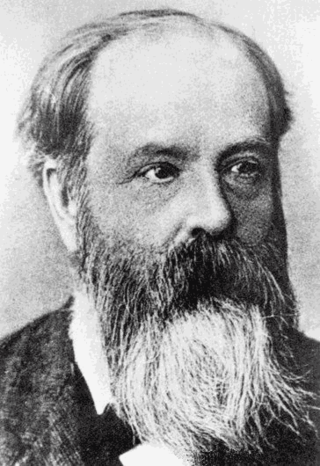
The Cavendish Laboratory is the Department of Physics at the University of Cambridge, and is part of the School of Physical Sciences. The laboratory was opened in 1874 on the New Museums Site as a laboratory for experimental physics and is named after the British chemist and physicist Henry Cavendish. The laboratory has had a huge influence on research in the disciplines of physics and biology.
Optica is a professional society of individuals and companies with an interest in optics and photonics. It publishes journals, organizes conferences and exhibitions, and carries out charitable activities.
The Institute of Physics (IOP) is a UK-based not-for-profit learned society and professional body that works to advance physics education, research and application.

Farrer Herschell, 1st Baron Herschell,, was Lord High Chancellor of Great Britain in 1886, and again from 1892 to 1895.

Sir George Otto Trevelyan, 2nd Baronet, was a British statesman and author. In a ministerial career stretching almost 30 years, he was most notably twice Secretary for Scotland under William Ewart Gladstone and the Earl of Rosebery. He broke with Gladstone over the 1886 Irish Home Rule Bill, but after modifications were made to the bill he re-joined the Liberal Party shortly afterwards. Also a writer and historian, Trevelyan wrote his novel The Competition Wallah in around 1864, and The Life and Letters of Lord Macaulay, his maternal uncle, in 1876.

Frederick Guthrie FRS FRSE was a British physicist, chemist, and academic author.
The Chemical Society was a scientific society formed in 1841 by 77 scientists as a result of increased interest in scientific matters. Chemist Robert Warington was the driving force behind its creation.

George John Shaw Lefevre, 1st Baron Eversley was a British Liberal Party politician. In a ministerial career that spanned thirty years, he was twice First Commissioner of Works and also served as Postmaster General and President of the Local Government Board.

John Hall Gladstone FRS was a British chemist. He served as President of the Physical Society between 1874 and 1876 and during 1877–1879 was President of the Chemical Society. Apart from chemistry, where one of his most notable publications was on bromination of rubber, he undertook pioneering work in optics and spectroscopy.

The Michael Faraday Medal and Prize is a gold medal awarded annually by the Institute of Physics in experimental physics. The award is made "for outstanding and sustained contributions to experimental physics." The medal is accompanied by a prize of £1000 and a certificate.
The Iron and Steel Institute was a British association originally organized by the iron trade of the north of England. Its object was the discussion of practical and scientific questions connected with the manufacture of iron and steel.
The Dennis Gabor Medal and Prize is a prize awarded biannually by the Institute of Physics for distinguished contributions to the application of physics in an industrial, commercial or business context. The medal is made of silver and is accompanied by a prize and a certificate.

William Glynne Charles Gladstone was a Liberal Party politician in the United Kingdom, and the last of four generations of Gladstones to sit in the House of Commons, the first being his great-grandfather Sir John Gladstone (1764–1851). His body was the last to be officially repatriated to the United Kingdom during the First World War.

The Medical Society of London is one of the oldest surviving medical societies in the United Kingdom.
The Gunning Victoria Jubilee Prize Lectureship is a quadrennial award made by the Royal Society of Edinburgh to recognise original work done by scientists resident in or connected with Scotland.
The Optical Society was a scientific society founded in London in 1899, which published Transactions of the Optical Society.










